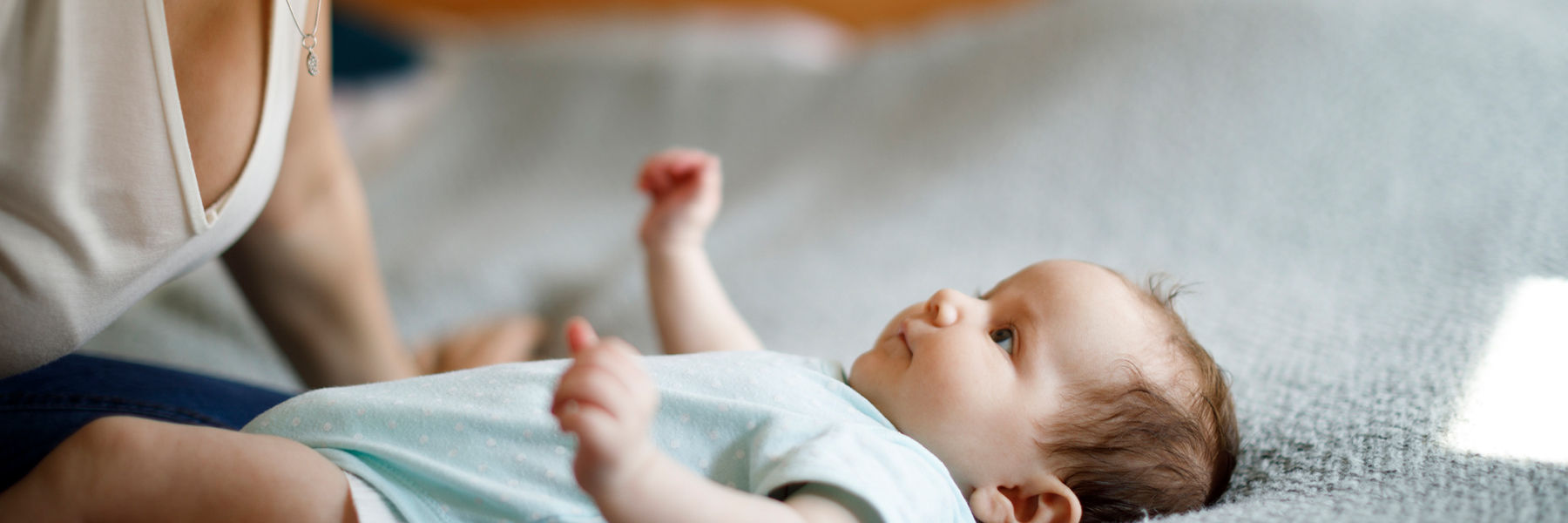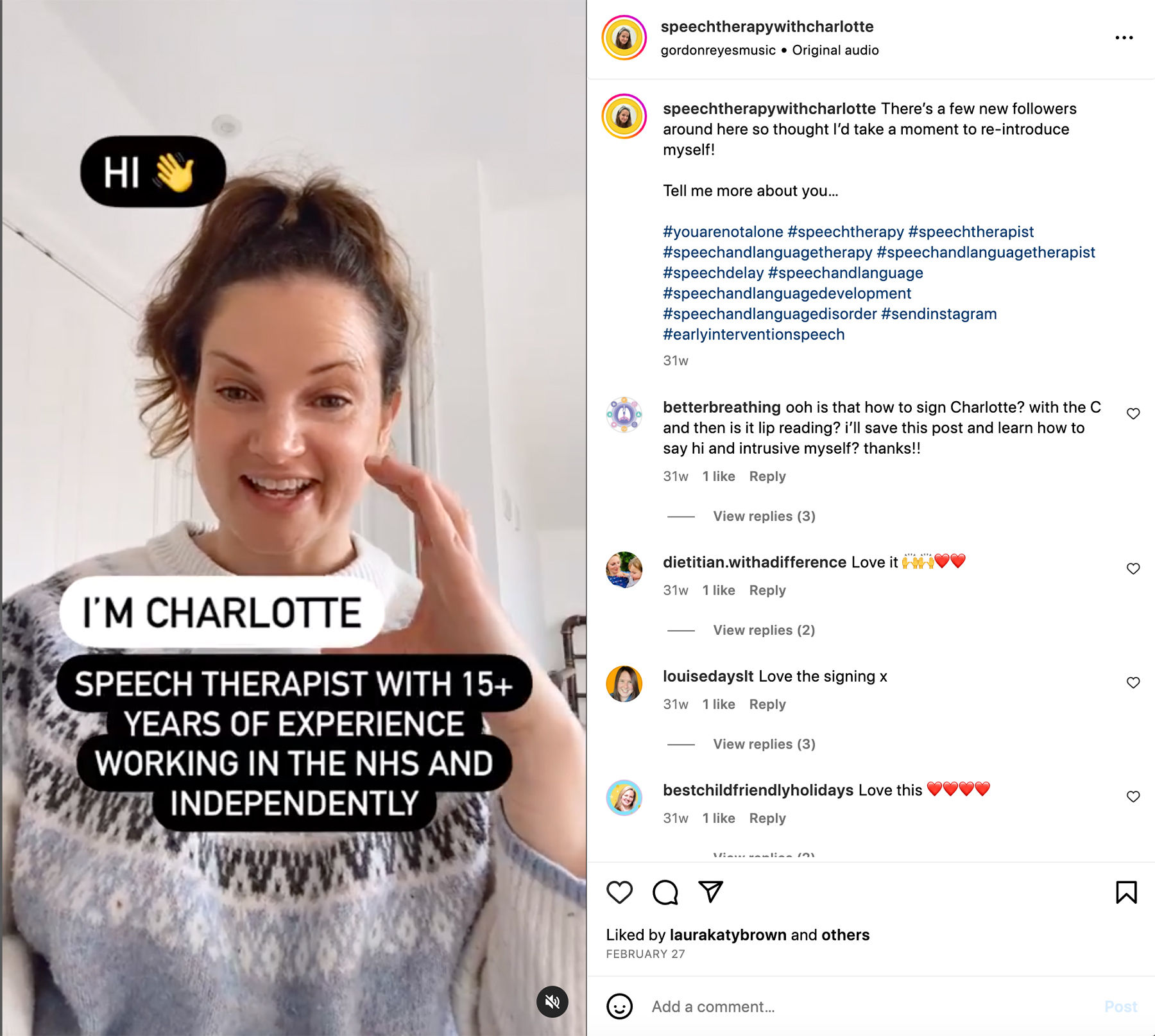Use arrow keys to navigate through the menu items. Use Tab key to navigate through the menu banners.
Talk To Your Baby

Talk To Your Baby
Speech and Language Therapist Charlotte Hall explains why it’s never too soon to start chatting to your little one
When you have a tiny baby it’s only natural to focus on feeding, sleeping, cuddles and changing nappies. Talking to your baby as you go about your daily routine might seem a bit pointless, and even make you feel self-conscious – after all they can’t understand or communicate at this stage, right?
Not so, says Speech and Language TherapistCharlotte Hall (@speechtherapywithcharlotte). ‘Talking to your baby right from the start can make a real difference to how they develop and learn,’ she says.
Recent research by Speech and Language UK estimates at least 1.9 million children, or one in 5 school-age children, are behind in both talking and understanding words.
So, anything you can do to introduce and encourage communication will only be a good thing. Think of it as bonding time with brain-boosting benefits!

How to talk to your baby
If you’ve already found yourself talking to your baby in a totally different voice and pitch, then the good news is you’re on the right track. Researchers at the University of Cambridge investigated the effects of using ‘parentese’ – where we instinctively use a baby voice and cuter, more rhythmical versions of words like doggy, bunny and mummy (instead of dog, rabbit and mum) – on babies’ brains.
Professor Usha Goswami, who led the study, says parentese or baby talk is beneficial for babies because it makes our rhythm pattern really obvious and clear for them, making it easier to recognise words. ‘When babies are able to clearly pick words out in this way, they're more likely to remember them,’ she says.
‘Luckily,’ adds Charlotte Hall, ‘using parentese to talk to babies is something we tend to naturally adopt when talking to a baby, so it’s not something you’ll have to master. You’re probably doing it already!’
How to boost your baby talk
If you’d like some easy ways to get used to chatting and communicating with your baby, try these ideas.
Find time for ‘face time’
Charlotte recommends spending some face-to-face time with your baby. ‘Copy their facial expressions and sounds and let them watch your face as you talk. It’s a great way to start an early conversation!’
Narrate your day
TV personality Dani Dyer is an ambassador for the BBC’s Tiny Happy People Campaign and mum to Santiago, 2, and baby twins Summer and Star. ‘Just talking about what you're doing can really help,’ she says. ‘If you're washing up, tell your baby, or talk about what they're having for dinner.’
Play peekaboo
This game is a great way to entertain your baby, but it also helps their early language learning as they wait their turn to react. Watch this fascinating video to find out more!
Make the most of nappy changes
Nappy changes can be a great time to chat with your baby. Your baby can ‘listen to the sound of your voice and the words you say while watching the expressions you make with your face,’ says the BBC’s Tiny Happy People language learning campaign.
Read and chat
Stuck for words? Looking through picture books with your baby will naturally inspire you to chat about what you can see. You’ll find a selection of picture books for little ones here.
Try ‘noisy’ toys
Rachael Kirby is mum to 5-month-old twins. She’s found that toys with sounds, words and music can help to teach babies the art of conversation. ‘My babies bat at the toy or I push a button for them, and in response, the toy makes a noise. It’s teaching them the ebb and flow of conversation!’
Cut out distractions
Quiet time is also important, so try to spend some time each day with the TV or radio off. Giving your baby attention without distractions will help develop their listening and concentration skills.
When will my baby start babbling?
Babies develop at different rates, but typically at 2 months your baby will be cooing and gurgling, and between 4 and 6 months they will begin to make babbling sounds such as ‘daa’ or ‘baa’. Babies generally start communicating using recognisable speech between the age of 12 and 24 months. But every child is different.
‘If you’re worried about your baby’s development, talk to your health visitor or GP,’ says Charlotte.
Help & Customer service
- Help Centre
- How to shop
- Product recalls
Payment Methodslist with 8 items
- Asda Group of Companies
- Modern Slavery Statement
- Electrical Waste Recycling
- Terms & Conditions
- Customer Review Policy
- Privacy Centre
- Cookie Settings
- Accessibility
© ASDA 2025